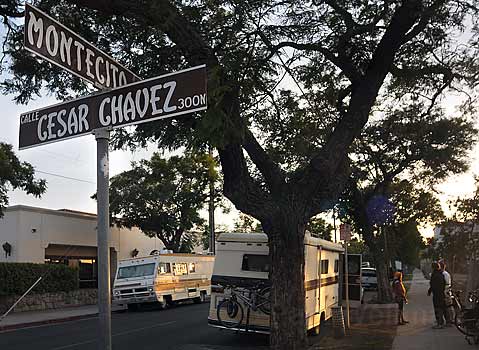Homeless to Move Along
Neighbors Decry RV Encampments

A bid by police and public works staff to disperse troublesome collections of recreational vehicles on East Montecito Street and near Santa Barbara Junior High School was rebuffed by the city’s ordinance committee. Simply put, the ordinance would have authorized city staff to post signs banning RV parking in areas where neighbors find them objectionable.
Numerous representatives from business parks near the intersection of East Montecito and Cesar Chavez Streets came before the committee to describe problems they had with some of the RV-dwellers, alleging everything from verbal abuse to excrement-dumping to prostitution and drug dealing. Santa Barbara Junior High School Principal John Becchio said students and parents were uncomfortable with the RVs parked more or less permanently on steets surrounding the school’s playing fields, while SBPD Sgt. Brent Mandrell displayed photographs illustrating electric cords draped across the sidewalk, and bikes and dogs blocking the sidewalk. Fire Chief Joe Poire described a fright show of fire hazards including cooking, candles, fuel loads from accumulations of combustibles in the RVs, and electrical problems in poorly maintained older vehicles.
Although existing laws already address most of these problems, enforcement is difficult, said Mandrell. For example, while it is illegal to sleep in one’s car, police can’t just leave a sleeping ticket on the windshield, or the charge will be thrown out of court. Officers have to hand the ticket directly to the suspected sleeper; if the person in the RV does not answer the officer’s knock, the officer is faced with the problematic option of breaking into the vehicle to issue the ticket. In cases of litter or vandalism, it is hard for officers to determine whom to ticket.
On top of that, said City Attorney Steve Wiley, Santa Barbara judges will not issue bench warrants when people fail to appear in court or pay fines for such infractions, because of overcrowding in the County Jail. They generally instruct the authorities to seek a civil remedy, Wiley said, which means taking the alleged violator to small-claims court, which would result in a relatively small and hard-to-collect monetary judgement. “That’s an absolutely ridiculous, if you will, enforcement methodology,” said Wiley.
It would be far easier, Mandrell concluded, if officers could just ticket the RVs for illegal parking. The city could tow a vehicle that accumulated five or more tickets.
Public Works staffer Browning Allen assured the ordinance committee, and the homeless advocates waiting their turn to speak, that staff had no intention of banning RV parking citywide, but only “case-by-case,” in places where they congregate and it becomes a problem.
“It’s just a shell game where we will drive them from one place to another until there’s no place left, and we all know that,” responded Peter Marin, of the Committee for Social Justice. He reminded the ordinance committee of the lawsuit that his group-which defends the homeless, and whose lead attorney is former Public Defender Glen Mowrer-won when the city attempted to ban RV parking citywide a few years ago.
Also weighing in was Roger Heroux, former director of the County Public Health Department, who said that punitive measures are no answer because the economy is putting more and more people on the street. Transition House turned away 20 families in October, and every last one of the other South County homeless shelters are also full, he said. Gary Linker, of New Beginnings, reported that his program for homeless sleeping in their cars provides supervised parking for 65 to 70 vehicles nightly, and he has one fulltime staffer searching for additional parking places.
Ultimately the ordinance committee’s three members-Das Williams, Grant House, and a reluctant Dale Francisco, who favored the ordinance staff as drafted-directed city staff to come back with an ordinance that specifically bans RV parking near schools, parks, and other places where children gather. That would effectively relieve the concerns of the businesses on Montecito Street, said Williams, because they are near Casa de la Raza, which has a youth program.
Beyond that, Williams and House said, the matter should be taken before the city’s homeless policy committee, where enforcing agencies and homeless workers can work together-an approach that Wiley complained would result in “a very broad discussion.”



